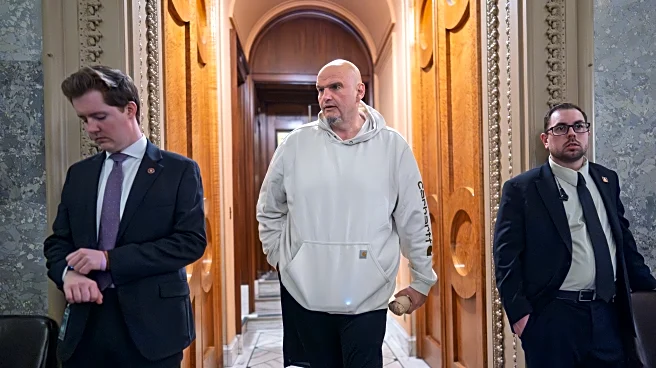The Senate passed legislation Monday to reopen the government, bringing the longest shutdown in history closer to an end as a small group of Democrats ratified a deal with Republicans despite searing criticism
from within their party.
The 41-day shutdown could last a few more days as members of the House, which has been on recess since mid-September, return to Washington to vote on the legislation. President Donald Trump has signaled support for the bill, saying Monday that “we’re going to be opening up our country very quickly.”
The final Senate vote, 60-40, broke a grueling stalemate that lasted more than six weeks as Democrats demanded that Republicans negotiate with them to extend health care tax credits that expire Jan. 1. The Republicans never did, and five moderate Democrats eventually switched their votes as federal food aid was delayed, airport delays worsened and hundreds of thousands of federal workers continued to go unpaid.
The Latest:
The president called into ESPN’s Pat McAfee Show and predicted that, with college football teams offering top recruits big money to play for them, “You got to have like NFL-type payroll” levels to compete.
He said that “colleges don’t make that much money.”
Trump suggested a salary cap like the NFL and other leagues have would help, and added of college sports, “Bad things are going to happen unless they figure this out.”
The president also repeated his past criticisms of the NFL kickoff rule, saying it didn’t promote safety but made the game “so unromantic.”
“I hope college doesn’t change” its kickoff rules, Trump said while wishing, “Someday, the NFL will stop it and go back to football.”
Connecticut state lawmakers are still pushing ahead with a plan to set aside $500 million in state budget reserves to help backstop delays in federal food and heating assistance funding, even though it appears the federal government shutdown could be nearing an end.
If a deal to reopen the federal government is finalized soon, a spokesperson for Democratic Gov. Ned Lamont said Tuesday the $500 million could help address federal funding cuts in the sweeping tax and spending law dubbed the “One Big Beautiful Bill Act” by Republicans.
There are concerns as to how the massive federal budget law will impact Medicaid, food benefits and other safety net programs in Connecticut.
Meanwhile, at least one Democratic state senator has called for the state to cover the health insurance tax credits under the Affordable Care Act that expire Jan. 1, 2026. The subsidies total $350 million annually in Connecticut.
The bipartisan proposal to create a “state response fund,” announced Monday, is scheduled for a vote during a special legislative session on Wednesday and Thursday.
The League of United Latin American Citizens is urging Congress, the Department of Veterans Affairs and state governments to accelerate benefit reform that would expand health access, strengthen suicide-prevention outreach for veterans and invest in culturally responsive support for Latino veterans and families.
LULAC National Vice President for Military Affairs, Lawrence Romo said Veterans Day serves as a standing promise that the U.S. government will “stand by its defenders long after the battles have ended.”
“Latino veterans have never hesitated to serve,” Romo said. “Now the nation must ensure that they receive benefits, strong mental health support and real pathways to rebuild their live. Anything less is unacceptable.”
The president told veterans: “We love you. We salute you. And we will never forget what you’ve done to keep America safe, sovereign and free.”
The president acknowledged a long list of administration officials present at the ceremony, including House Speaker Mike Johnson.
He saluted Johnson for the “big victory” of the government being on the verge of reopening after a lengthy shutdown.
Trump said he’d like to personally acknowledge more people attending, but that low temperatures made him rethink that: “It’s a little cold.”
“They did one thing above all else. They put America first,” Trump said of veterans, adding they were “very, very special people and always in our heart.”
Democratic Wisconsin Gov. Tony Evers said Tuesday that he was not going to criticize Democratic senators who voted for the deal to reopen the federal government.
“They have good reasons for doing it,” Evers told The Associated Press. “I’m not here to complain about them.”
Evers said it was “hard to say” whether the deal will make it easier or more difficult to extend health care tax credits that expire Jan. 1 as Democrats had pushed for.
“It’s going to be difficult regardless because Republicans have been pretty clear that they don’t want to do anything,” Evers said. “But I think at the end of the day, when they see what’s happening locally, we might have some progress.”
Trump has pardoned the husband of Rep. Diana Harshbarger of Tennessee.
Robert Harshbarger Jr., who was a licensed pharmacist, pleaded guilty in 2013 to substituting a cheaper drug imported from China that was not approved by the U.S. Food and Drug Administration for a drug the FDA had approved for kidney dialysis patients.
A White House official on Tuesday defended the pardon, saying Harshbarger was a victim of “excessive prosecution” and had engaged in a practice that’s common among pharmacists.
Harshbarger was sentenced to and served four years in prison.
The pardon was among a batch that Trump granted on Friday.
“Today, to every veteran -- we love our veterans -- we say the words too often left unsaid: Thank you for your service. Thank you.”
He was introduced to the audience in the amphitheater by Vice President JD Vance, a former Marine.
A Utah judge has rejected a new congressional map drawn by Republican lawmakers, adopting an alternate proposal creating a Democratic-leaning district and throwing a curveball to the GOP in a state where they expected a clean sweep ahead of the 2026 midterm elections.
Republicans hold all four of Utah’s U.S. House seats and had advanced a map to protect them. Judge Dianna Gibson ruled just before a midnight Monday deadline that it “unduly favors Republicans and disfavors Democrats,” despite her order to draw a map that complies with standards established by voters to ensure districts don’t deliberately gerrymander to favor a party.
Gibson ultimately selected a map drawn by the League of Women Voters of Utah and Mormon Women for Ethical Government that puts Salt Lake County almost entirely within one district, instead of dividing the heavily Democratic population center among all four.
▶ Read more about the Utah ruling and its impact
Top diplomats from the Group of Seven industrialized democracies are converging on southern Ontario as tensions rise between the U.S. and traditional allies like Canada over defense spending, trade and uncertainty over President Donald Trump’s ceasefire plan in Gaza and efforts to end the Russia-Ukraine war.
Canadian Foreign Minister Anita Anand said in an interview with The Associated Press that “the relationship has to continue across a range of issues” despite trade pressures as she prepared to host U.S. Secretary of State Marco Rubio and their counterparts from Britain, France, Germany, Italy and Japan on Tuesday and Wednesday.
Anand also invited the foreign ministers of Australia, Brazil, India, Saudi Arabia, Mexico, South Korea, South Africa and Ukraine.
▶ Read more about developments at the G7 summit
The USS Gerald R. Ford has officially entered the U.S. Southern Command region, almost three weeks after Defense Secretary Pete Hegseth first announced he was ordering the aircraft carrier to aid in the campaign against alleged drug smugglers, according to a press release.
However, since the region’s borders reach well into the Atlantic Ocean, coming within a few hundred miles of Africa, it’s not clear just how close the carrier or its accompanying destroyers are to Caribbean waters. Multiple military officials wouldn’t offer further location details when asked by The Associated Press.
The Navy’s press release said the Ford and three destroyers — the USS Bainbridge, USS Mahan, and USS Winston Churchill — will join seven other ships, including three that carry a Marine Expeditionary Unit made up of thousands of Marines, that have been in the Caribbean for months.
Trump and Vice President JD Vance both wore gloves and overcoats against the cold in Washington, and the president also had a red scarf.
Trump stepped forward and laid a wreath at the Tomb of the Unknown Soldier, then reached out and touched the wreath before taps was played.
He, Vance and other top administration officials saluted throughout the song.
The typical Sora video, made on OpenAI’s app, is designed to be amusing to click and share on TikTok, Instagram, X and Facebook. But a growing chorus is raising alarms about the dangers of letting people create AI videos showing just about anything they can type into a prompt, leading to the proliferation of nonconsensual images and realistic deepfakes.
“Our biggest concern is the potential threat to democracy,” Public Citizen tech policy advocate J.B. Branch in an interview as the nonprofit watchdog sent a letter Tuesday to OpenAI, its CEO Sam Altman and to Congress. “I think we’re entering a world in which people can’t really trust what they see. And we’re starting to see strategies in politics where the first image, the first video that gets released, is what people remember.”
OpenAI didn’t immediately respond to a request for comment Tuesday.
▶ Read more about how advocates see OpenAI’s Sora videos threatening democracy
In another world, problematic social media posts, a tattoo closely resembling a Nazi symbol and a sudden turnover in campaign staffers would have sunk any political candidate. But Graham Platner, looking to flip a Maine U.S. Senate seat in a key 2026 contest, isn’t stepping aside.
A plain-speaking oyster farmer and combat veteran, Platner has been open about his mistakes and struggles with post-traumatic stress disorder. He’s convinced his brand of gruff populism and calls for economic equality are what’s needed to beat Gov. Janet Mills for the Democratic nomination and then unseat five-term incumbent Republican Sen. Susan Collins.
“I’m not doing this because I want power, I want influence, or I want money,” Platner told The Associated Press. “I’m doing it because we need a better politics, and I’m committed to that project.”
▶ Read more from the AP interview with Platner
Many Americans are stretched to the limit as they wait for the U.S. Supreme Court and Congress to decide when full payments will resume under the SNAP food aid program that helps 1 in 8 Americans buy groceries. Like Jim Malliard, 41, of Franklin, Pennsylvania, who said he had not received anything by Monday.
Malliard is a full-time caretaker for his wife, who is blind and has had several strokes, and his teenage daughter, who suffered severe medical complications from surgery. He previously received $350 a month in SNAP payments to help buy food for the family. Now he’s down to $10 in his account and what’s left in their pantry — mostly rice and ramen.
“It’s kind of been a lot of late nights, making sure I had everything down to the penny to make sure I was right,” Malliard said. “To say anxiety has been my issue for the past two weeks is putting it mildly.”
Thousands of people symbolically formed a human shield Tuesday around a bombed-out military complex in Serbia, vowing to protect it from redevelopment as a luxury compound by a company linked to Trump’s son-in-law Jared Kushner.
Youth-led protesters drew a red line as they encircled the sprawling buildings in the capital, Belgrade that were partially destroyed in a 1999 NATO bombing campaign. The site faces demolition and redevelopment under a plan backed by the populist pro-Trump government of President Aleksandar Vucic.
The $500-million project to build a high-rise hotel, offices and shops at the site has met fierce opposition from experts at home and abroad, as well as the Serbian public. It’s the latest flashpoint in yearlong protests against rampant corruption that have shaken Vucic’s firm grip on power.
▶ Read more about Kushner’s controversial real estate investments in Eastern Europe
Everyday people have improvised such stopgap efforts to support their communities through the shutdown. Whether feeding hungry families or maintaining local museum tours, volunteers nationwide are strengthening social ties they hope will continue making their neighbors whole amid persistent precarity.
Anna Culbertson, a National Institute of Allergy and Infection Diseases program specialist, was among the thousands laid off this spring at the nation’s top health agencies. She then co-founded 27 UNIHTED, a National Institutes of Health alumni network providing peer support and career resources.
The network put together food drives for federal employees going without pay and created a spreadsheet identifying help for furloughed workers and placed collection boxes outside Panera Bread and Starbucks locations as well as the “No Kings” protest in Washington, D.C.
▶ Read more about how grassroots philanthropy is responding to the shutdown
But Scott Bessent didn’t say how much of a profit the U.S. made after it bought Argentine pesos and finalized a $20 billion currency swap line with the South American country’s central bank. Nor was he asked for a dollar amount during an interview on MSNBC’s “Morning Joe.”
He was asked how extending a financial lifeline to the cash-strapped U.S. ally helped Americans. A currency swap line is an agreement between two central banks to exchange currencies.
“By stabilizing the economy there and making a profit, then that’s a very good deal for the American people,” Bessent said. “We made a lot of credit available. A small amount of it was drawn on and we have made a profit on that.”
The president is scheduled to participate in an annual wreath-laying ceremony and deliver remarks at the amphitheater.
It is the Republican’s first Veterans Day since he returned to office.
On Sunday, Trump read an oath for members of the military to recite as part of an on-field enlistment ceremony during halftime at the NFL game between the Washington Commanders and the Detroit Lions.
Air travelers could face more frustration as busy U.S. airports need to meet a higher FAA target for reducing flights Tuesday after already canceling thousands to scale back demands on the nation’s aviation system during the government shutdown.
The FAA ordered domestic airlines last week to drop 4% of their flights at 40 major U.S. airports, saying absences and signs of stress among traffic controllers made it imperative to act in the name of public safety. After already canceling more than 7,900 flights since Friday, the goal for cutting flights is set to rise to 6% on Tuesday and again to 10% on Friday.
But it was unclear exactly how many additional flights would need to be canceled Tuesday. The average cancellation rate over the last few days already exceeded the FAA’s requirement, according to aviation analytics company Cirium. The FAA also expanded its flight restrictions Monday, barring business jets and many private flights from using a dozen airports already under commercial flight limits.
▶ Read more about how the shutdown is impacting flights in the U.S.
It’s up to the U.S. Supreme Court and Congress to decide when full payments will resume under the SNAP food aid program that helps 1 in 8 Americans buy groceries as the financial pressures mount on families in some states.
The Supreme Court is expected to rule Tuesday on a request from President Donald Trump’s administration to keep blocking states from providing full benefits, arguing the money might be needed elsewhere.
The seesawing rulings so far have created a situation where beneficiaries in some states, including Hawaii and New Jersey, have received their full monthly allocations and those in others, such as Nebraska and West Virginia, have seen nothing.
The legal wrangling could be made moot if the U.S. House adopts and Trump signs legislation to end the federal government shutdown quickly.
▶ Read more about the Supreme Court’s decision
The longest federal government shutdown in U.S. history appears to be nearing an end, but not without leaving a mark on an already-struggling economy.
About 1.25 million federal workers haven’t been paid since Oct. 1. Thousands of flights have been canceled, a trend that is expected to continue this week even as Congress moves toward reopening the government. Government contract awards have slowed and some food aid recipients have seen their benefits interrupted.
Most of the lost economic activity will be recovered when the government reopens, as federal workers will receive back pay. But some canceled flights won’t be retaken, missed restaurant meals won’t be made up, and some postponed purchases will end up not happening at all.
The Congressional Budget Office estimated that a six-week shutdown will reduce growth in this year’s fourth quarter by about 1.5 percentage points. That would cut growth by half from the third quarter. The reopening should boost first-quarter growth next year by 2.2 percentage points, the CBO projected, but about $11 billion in economic activity will be permanently lost.
▶ Read more about the impact of the longest government shutdown in history
The Senate passed legislation Monday to reopen the government, bringing the longest shutdown in history closer to an end as a small group of Democrats ratified a deal with Republicans despite searing criticism from within their party.
The 41-day shutdown could last a few more days as members of the House, which has been on recess since mid-September, return to Washington to vote on the legislation. President Donald Trump has signaled support for the bill, saying Monday that “we’re going to be opening up our country very quickly.”
The final Senate vote, 60-40, broke a grueling stalemate that lasted more than six weeks as Democrats demanded that Republicans negotiate with them to extend health care tax credits that expire Jan. 1. The Republicans never did, and five moderate Democrats eventually switched their votes as federal food aid was delayed, airport delays worsened and hundreds of thousands of federal workers continued to go unpaid.
House Speaker Mike Johnson urged lawmakers to start returning to Washington “right now” given shutdown-related travel delays, but an official notice issued after the Senate vote said the earliest the House will vote is Wednesday afternoon.
▶ Read more about the vote










